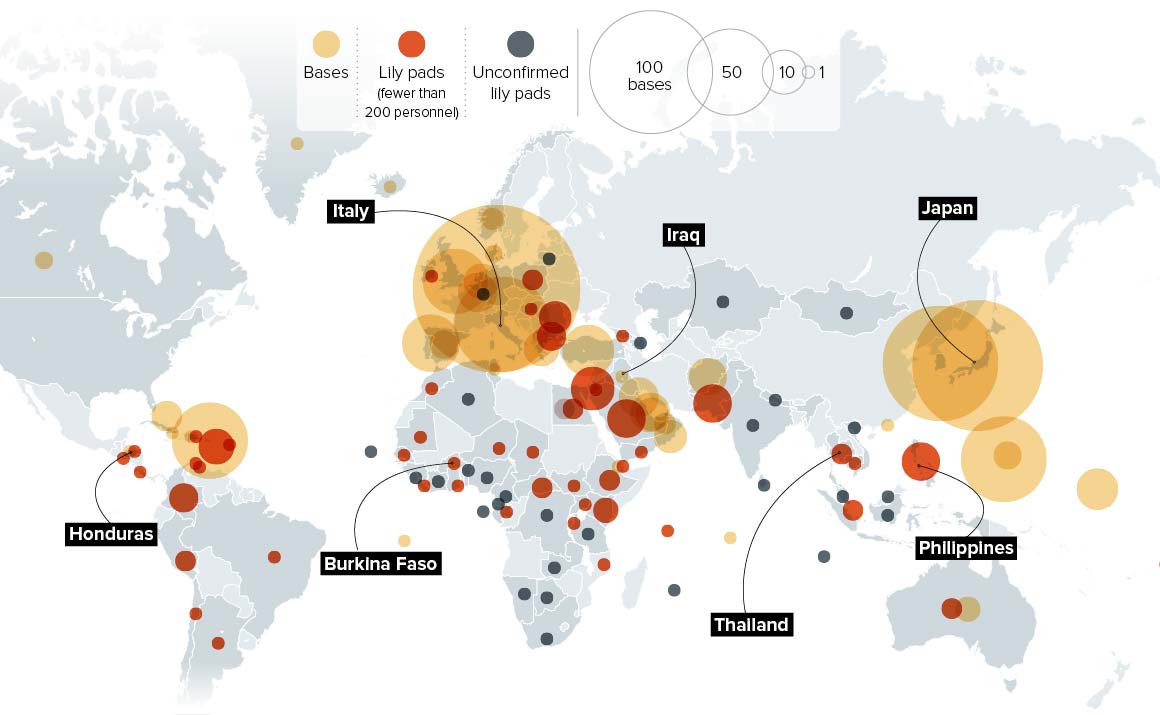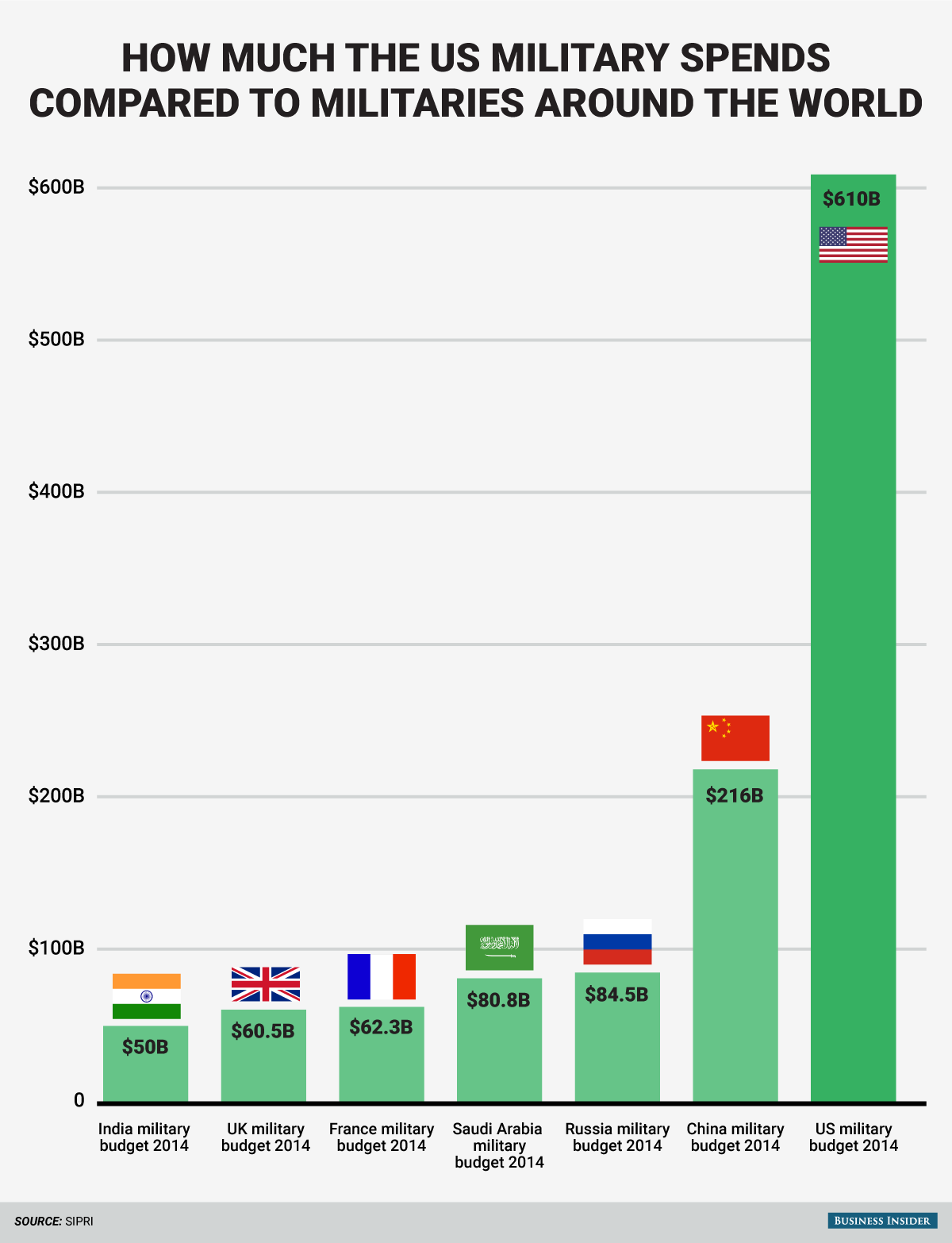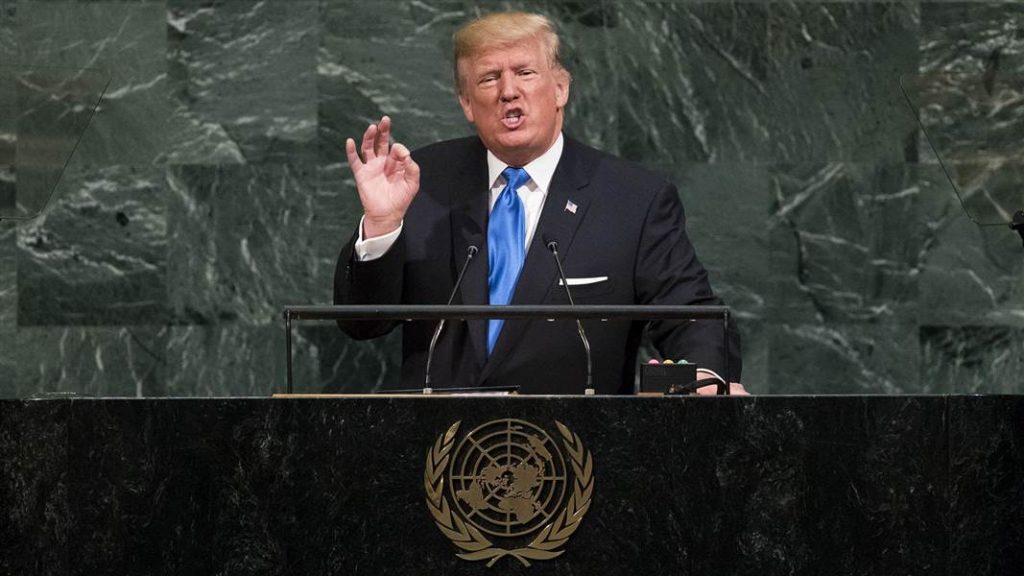Image from NBC News
When preparing to speak at the United Nations General Assembly, Trump was forced to face his own contradiction. For over a year, he has argued for a policy of “America First” and continually denigrated the United Nations, declaring that it is “ not a friend of democracy, it’s not a friend to freedom, it’s not a friend even to the United States of America.” Without backtracking from everything Trump promised his base, what would the president of the United States say to the 193 countries represented at the U.N.?
Some degree of backing away from the rhetoric of “candidate Trump” was to be expected. After all, nearly all of Trump’s campaign promises have been delayed (i.e. a border wall paid for by Mexico) or thwarted (i.e. the repeal and replace of Obamacare). Instead, now we find a “negotiating” Trump that has made two agreements with the Democrats in the past two weeks — one a formalized debt-ceiling deal and another, an informal agreement that, at least according to the Democrats, would ensure that DACA would continue in exchange for increased “border security”.
The differences between candidate Trump and President Trump are perhaps best illustrated in his changing position on the U.S. military presence in Afghanistan. Throughout his campaign, he promised to bring the troops home, but just last month, Trump backtracked and announced that he would be increasing the number of U.S. boots on the ground. According to General Mattis, another 3,000 troops will be deployed.
Amid all this backtracking and flip-flopping, the journalists, politicians, and world leaders were left wondering what kind of U.N. speech Trump would deliver.
The Speech
In a speech that would make his nationalist and xenophobic base proud, Trump’s U.N. address does not backtrack from his “America First” campaign message. But it is far from the relative isolationism that characterized candidate Trump in contrast to Hillary Clinton. In this sense, throughout the whole speech, Trump “has an eye on his electoral base, and his other eye on his audience of world leaders, with messages to his allies as well as his adversaries.” Harkening back to Bush’s Axis of Evil speech, Trump attempts to rally other countries to combat U.S. enemies. But Trump’s address goes further, outlining a Trump Doctrine — a broad vision for the world and the place of the U.S. and the U.N. — within it. At the center of the Trump Doctrine is “national sovereignty” which he sees as a building block to a supposedly harmonious world.
The speech began with the state of the U.S. economy, playing up America’s success for his base. He highlighted the low unemployment rate and the growth of the stock market even though Trump arguably has little to do with either. He also boasted of U.S. military strength and the $700 billion military budget approved nearly unanimously by both Democrats and Republicans.
Trump went on to paint a dire picture of the state of the world, recalling his “American carnage” inauguration speech. He stated it is up to us to “lift the world to new heights, or let it fall into a valley of disrepair.” Among the forces he claims will lead the U.S. and world into this valley of despair are North Korea, Iran, Venezuela and Cuba.
North Korea
The strongest words were reserved for North Korea, with whom tensions have been escalating over the past months. While Kim Jong-Un has threatened the U.S. territory of Guam, tested a hydrogen bomb and sent two missiles flying over the territory of U.S. ally Japan, Trump for his part has promised to bring “fire and fury” on North Korea — a threat that thus far has not materialized. Yet an increasing numbers Trump cabinet members state that they are considering military options — Nikki Haley, General Mattis, and Rex Tillerson. For now, however, Tillerson has promised a “peaceful pressure campaign” against North Korea. The first step to this is Trump’s executive order that targets individuals, banks and companies with ties to North Korea.
In his U.N. speech, Trump stunned onlookers with his threat not just against the North Korean dictator, but against all the North Korean people, declaring that if the U.S. is “forced to defend itself or its allies, we will have no choice but to totally destroy North Korea.” Although for now the conflict with North Korea is primarily a war of words, the fact that this threat was made by a man who holds the codes to the world’s largest nuclear arsenal cannot be ignored. Nor can we ignore that Trump leads a country with a history of leveling cities — Hiroshima and Nagasaki to name just two — and carrying out brutal wars of aggression in countries like Korea and Vietnam. In this sense, Trump’s rhetoric should taken seriously despite the fact that it seems that neither side wants an open war for now. Trump goes from this somber threat to his usual bullying irreverence, calling Kim Jong-Un “Rocket Man” — setting Twitter afire.
Seemingly undeterred, North Korea likened Trump’s speech to “the sound of a dog barking.”
Iran and the Middle East
Like Bush, Trump’s Axis of Evil includes Iran, which he accused of being a “corrupt dictatorship behind the false guise of a democracy.” He went on to denounce the Iran deal struck by Barack Obama, calling it “an embarrassment to the United States,” rhetoric that would make it difficult for Trump to avoid pulling out of the the agreement. This hard-line position, supported by Israel and Saudi Arabia, led Netanyahu to tweet “In over 30 years in my experience with the UN, I never heard a bolder or more courageous speech.”
From there, Trump went on to speak about the next great “evil” in the Middle East, “radical Islamic terrorism,” a term he has been criticized for using due to the false connection it constructs between Muslim people and terrorism. Even in the wake of increased hate crimes against Muslims in the U.S., Trump insists on this rhetoric, which plays well with his base. He also spoke against Al-Assad in Syria, defending the air attack launched by the U.S. in May, as well as lauding what he sees as advances in the fight against ISIS. These factors caused the refugee crisis in which, in order to justify the disgraceful position of closing American borders to refugees, Trump sought to cover it up with flowery language about compassion and a “safe, responsible, and humanitarian approach.” But there is nothing humanitarian about the Muslim Ban, his freeze on refugees, or his increased detentions of immigrants, all of which Trump fails to mention as he addresses the UN.
Venezuela and Socialism
In Trump’s view, the next “great evil” confronting the U.S. and the world is Maduro’s Venezuela, which Trump calls a socialist dictatorship in which people are hungry and democracy is being destroyed. This comes after the fourth rounds of sanctions, signed by the U.S. in late August, which “restrict the ability of Venezuela and state-owned oil company PDVSA to issue new debt or stock in U.S. dollars, or engage in other financial dealings with U.S. citizens.” This is the latest attack on the Venezuelan economy, further deepening the economic crisis in the country, leading directly to the starvation that Trump repudiated in his speech.
Trump argues that, in the South American nation, “democratic institutions are being destroyed” and he calls on the world to support “full restoration of democracy and political freedoms in Venezuela” — one of the few times in his four minute speech that Trump was applauded. Anyone with a even minimal understanding of the history of Latin America knows the deep hypocrisy inherent in the U.S. calling for democracy in its South American semi-colonies where U.S. imperialism has supported one coup after another, deposing democratically-elected leaders to replace them with dictators friendly to U.S multi-nationals. When the U.S. calls for democracy in Venezuela, what Trump really means is support for the right-wing opposition to Maduro, who would institute a U.S.-friendly government opening the country be bought up by U.S. corporate interests.
Trump here made a curious choice in dedicating several minutes to ideology. He said, “The problem in Venezuela is not that socialism has been poorly implemented, but that socialism has been faithfully implemented. From the Soviet Union to Cuba to Venezuela, wherever true socialism or communism has been adopted, it has delivered anguish and devastation and failure. Those who preach the tenets of these discredited ideologies only contribute to the continued suffering of the people who live under these cruel systems.” Yet, we have seen that far from adhering to socialism, or even anti-imperialism, when faced with Trump’s sanctions, the Maduro government has sought support from capitalist businesses abroad.
Among this long list of “evil” countries, two very important countries were conspicuously absent: China and Russia. Trump only mentioned them by name to applaud their support for sanctions against North Korea, although the speech did include a few indirect jabs at both countries. Yet, their relative absence in Trump’s speech should not be mistaken for a perceived lack of importance. Instead, this speech may be read as a letter to these two countries asking for their help and cooperation in reigning in the DPRK.
On Sovereignty
In his speech, Trump stressed that the United States does not seek to impose a form of government or way of life on any country, and that enshrined in Trump’s central principle of sovereignty is the idea that each country should decide for themselves. As Matthew Cooper argues in Newsweek, Trump’s speech included “a line that took a step away from the traditional U.S. emphasis on spreading democracy around the world. ‘We do not seek to impose our way of life on anyone.’ The statement must surely be comforting to the communist regime in Beijing, to African dictatorships. and to Middle Eastern countries that deny rights to women.”
Cooper’s statement is significant because it illustrates the logic of previous presidents who dressed up U.S. military interventions in humanitarian rhetoric. American allies, however, never had anything to worry about, no matter how dictatorial and how many human rights abuses they engaged in. Saudi Arabia has been a strategic ally of the U.S. for decades, despite jailing journalists, imposing the death sentence on children, and maintaining the subordination of women under law. However, under every president in recent history, communism, dictatorship, denial of rights to women or denial of human rights has been used as an excuse for military action. These principles were merely pretexts to cover up American economic and military interests. Trump, of course, uses these principles just like other U.S. presidents. However, unlike other presidents, he is upfront and open that U.S. (imperialist) interests come first and that the U.S. should not waste time or resources acting as the world’s police.
In this sense, Trump “unmasks” past presidents, presidents of other countries, and even the U.N., saying that the flowery language of international agreements merely obscures that each country is actually just looking out for their own. By Trump’s logic, sovereignty, a word he uses 22 times, is and should be the logic that governs international relations.
His central argument is that the politics of international bodies have failed — from the Paris Climate Agreement to the Iran Deal to even the UN which fails to keep world peace. So what is the way out for the 193 of nations gathered at the UN?
As the Greg Jaffe and Karen DeYoung of the Washington Post argue, “Trump cast his presidency as an avatar of international renewal — ‘a great reawakening of nations’ — built around his unique vision of global leadership and sovereignty. He described the world as weak and divided but suggested that a renewed patriotic spirit, national self-interest and cooperation among sovereign nations in pursuit of shared goals could cure most international ills.” Trump has argued that the U.S. should no longer play the role of world police and that upholding the world order must be taken up by other nations, particularly countries like Russia and China playing a larger role in containing North Korea.
He argued: “Our success depends on a coalition of strong and independent nations that embrace their sovereignty to promote security, prosperity, and peace for themselves and for the world.” In other words, countries who are strong and independent and follow their self interest are the building blocks of a peaceful world.
Imperialism and Faux Sovereignty
Yet this agenda of sovereignty creates a major contradiction. David Usborne of The Independent argues that the self-interest motivation “is a recipe not for world harmony but for jungle competition and conflict and is uniquely opposed to everything the UN stands for.” We all know that if each country simply follows their own self interest, there will inevitably be economic and military conflicts. Far from a formula for world peace, it is a recipe for increasing global clashes. This is obvious to everyone, so how can Trump make an argument for nationalistic sovereignty on a global scale?
Although Trump’s rhetoric unmasks the nationalism inherent in U.S. foreign policy, it also hides something very important: U.S. imperialism, the U.S. military and economic power of coercion. The U.S. controls much of the global economic market, so its sanctions crush the economies of countries across the world. Furthermore, as the U.S. has 800 military bases in more than 70 countries and territories around the world, the sovereignty for the semi-colonial countries is largely symbolic.

Image from Where in the World Is the U.S. Military?, Politico
Not only is Trump aware of this fact, he used it in his speech. In fact, the entire UN speech began with a reminder of U.S. military power inherent in the announcement of a new spending deal that increases a military budget that is already larger than the next ten countries’ military spending put together. He reminded the world that “suggestions” from the U.S. have vast economic and military power behind them. He reminded the word that “America First” does not mean isolationism, but a more direct and no-nonsense form of imperialism. Gone are the days of coalitions, agreements, negotiations, and Obama-era soft imperialism. Now the U.S. president is openly threatening to annihilate countries on the basis of American interests.

Skye Gould/Business Insider
In this sense, Trump is not actually defending sovereignty. He is putting forth a program of “America First” for the world and arguing that following America’s lead will bring international peace. He is demanding that other countries also put American interests first. Rather than international coalitions and negotiated agreements, Trump argues that the U.S.’ interests in the world should be the world’s interests — based not on spreading some lofty ideal, but on the naked economic and political self interest of each nation. He is attempting to sell this vision — that the U.S.’s enemies are in fact, their enemies — to Russia and China in particular.
The very same day of Trump’s speech, Emmanuel Macron gave a speech that was essentially a response to Trump’s vision of the world, stressing the need for nations to work together and maintain a dialogue: negotiation, not brunt force. Coalitions of nations, not a stress on nationalistic sovereignty. Macron represents the neoliberalism politics that is still seeking ways to recover after the 2008 crisis. Macron insists that the old way still works. Trump, on the other hand, represents that sector of American capitalists for whom neoliberalism didn’t work and who want to re-negotiate international deals to be even more favorable to the US. This shift from the world’s most important imperialist nation creates a volatile international situation, one that Macron and his speeches repudiating Trump cannot fix.











